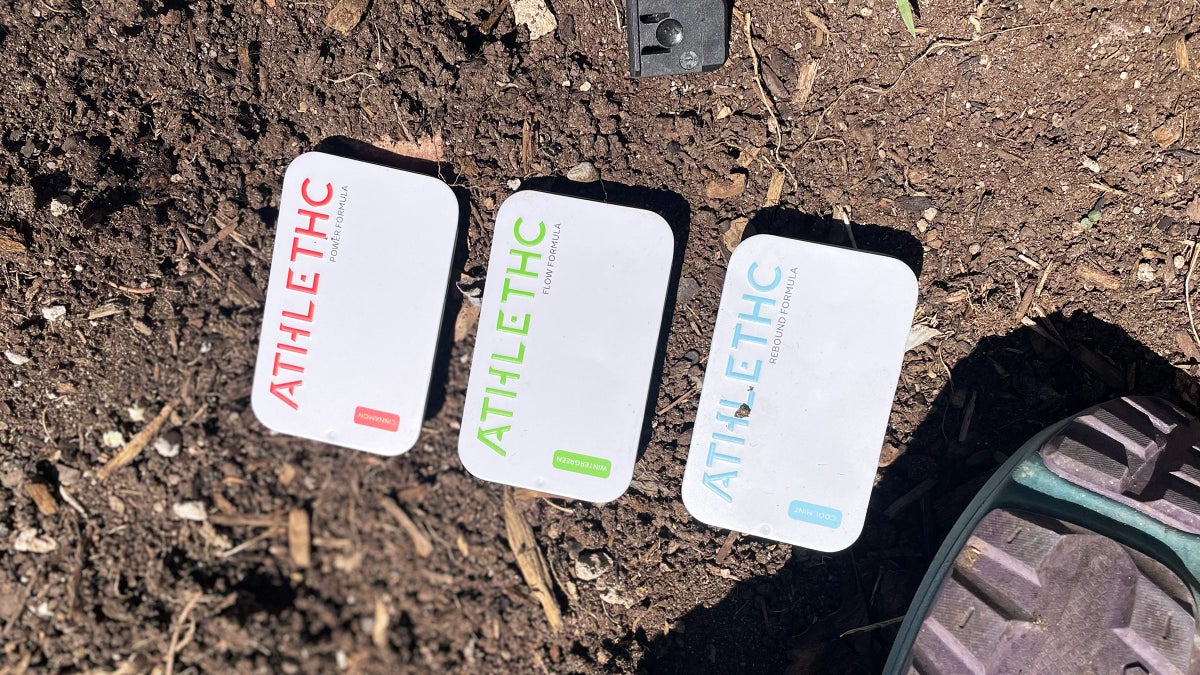
More and more athletes have been tapping into THC/CBD products to try to enhance their performance, feel less pain while training or competing, or aid their recovery from workouts, which includes improving their sleep.
The use of THC—the primary psychoactive compound from the cannabis plant—for recreational purposes is currently legal in 24 states (medical use is legal in 39 states), with some states only allowing hemp-derived forms of THC. A recent study by the University of Colorado at Boulder found little evidence of performance-enhancing effects of THC for athletes, but significant evidence that participants had greater enjoyment during and after their workouts.
To find out for myself how THC affects workouts, for the past couple of months, I’ve been testing a range of hemp-derived THC/CBD mints called AthleTHC that are meant to support athletes of all kinds.
AthleTHC hit the scene in December 2024. Two Brazilian Jiu Jitsu athletes—a power lifter and an ex-Navy Seal—who’d found success with their Kill Cliff CBD products, created three formulas of THC-based mints. Each one is blended with non-psychoactive CBD, CBG, CBC, and/or THCV, which are all derivatives from the cannabis plant with different effects.
Here’s how AthleTHC’s three formulas, Rebound, Flow, and Power, have worked for me over the past months.
Rebound: THC (2mg), CBD, CBC
I’ve taken the Rebound formula mostly in the evenings after snowboarding or running, or on evenings when other people might have a beer after work or wine with dinner. It makes me feel relaxed, content, and less easily annoyed. I sleep better. I say amusing (to me, anyway) things while watching TV. If I have a nagging pain of any sort, it takes the edge off. I either feel my pain less, or think I feel my pain less. Or don’t care as much that I have pain. However, whenever I pop one, I’m maybe a little—what was I going to say?— inconsequentially forgetful.
WHY: Two milligrams of THC is considered a micro-dose, but since individual tolerances vary, it may be a regular or even mega-dose. THC is straight-up weed (hence, my feelings of amusement post-mint). CBD is known to relax, reduce pain caused by inflammation, lower anxiety, and treat sleep and even seizure disorders. Studies suggest that the addition of CBD to this mint, and the other two (as well as to any other edible with THC), either increases the effects of THC or decreases them. In my anecdotal studies, I’ve found CBD to generally mellow out THC. Like CBD, CBC is non-psychoactive. It’s been studied for its therapeutic potential as anti-inflammatory, antibacterial, anticonvulsant, anti-depressant, and pain-blocker.
Flow: THC (2mg), CBD, CBG
I’ve tested the Flow formula a few times while snowboarding. (It is called “Flow,” after all.) I’ve also used it once while running (from home; I did not drive). I’ve found it, indeed, makes my activity feel flowy—smooth snowboarding turns (in my head or in reality, tbd), and focused foot placement on rocky trails (I didn’t trip and felt in flow). It makes putting away laundry less tedious. It makes puttering around doing yardwork a happy and effective activity instead of a chore. It makes sitting down to work on things I find boring feel pleasant. This one also helps me sleep. The Flow mint might be my favorite of the three.
WHY: The formulation of the Rebound mint and the Flow mint are similar—both have THC and CBD—but the addition of CBG rather than CBC creates a different effect…though it’s possible that this is in my head. Like CBD, CBG is non-psychotic. Current studies reveal that CBG has therapeutic effects of reducing inflammation, protecting the central nervous system, managing pain, helping metabolic syndrome, and even aiding cancer treatment. It can also be used as an antibacterial. CBG has been shown to work like acetaminophen by inhibiting the same enzyme.
Power: THC (2mg), CBD, THCV
The Power formula has scared me. For one thing, the thought of “Power” edibles of any sort leads me to believe that I’ll go into a weightlifting rage and pull a muscle. Or I’ll run too intensely up my local hill and yell at the top of my lungs from the summit. Even the color is intimidating: while the Rebound mint is white with a cool mint flavor, and the Flow mint is green and spearmint, Power is cinnamon red. Red means rage.
But, in the pursuit of science and journalism, I did it. I popped one and headed out my door for an afternoon run. I may have thought a downed yard waste bag was a lion for a millisecond. I also may have seen faces carved into trees that weren’t there, and considered adding two miles to the end of my run for fun until my nagging calf brought me back to reality.
According the AthleTHC, the Power mint is “meant to increase energy and support focus” and provide a ”more stimulating experience.” Did the THC enhance my performance? I’m not sure; I ran pretty slowly. Did it hinder it? No. I found myself a little dizzy before I headed out the door. While on the run, I felt okay, albeit, a little crazy.
WHY: I am not sure why I felt slightly hallucinogenic on my run, as the third ingredient in this mix, THCV, lacks the psychoactive properties of THC. Along with decreasing appetite, THCV is known to increase metabolism, which increases energy. Maybe that’s why I felt a touch crazy. It’s possible that it was the THC, I hadn’t eaten much, and I knew I had THC in my system and so my brain was open to things it wouldn’t be otherwise. THC has been known to elevate heart rates; that’s why it’s no longer a banned substance in some professional sports leagues. I have not gauged my heart rate after ingesting a POWER mint. Perhaps I need more research.
THC for Athletes: Promising, but More Testing Needed
I appreciated that AthleTHC mints come in little tins that make them inconspicuous and easy to carry, although the cover says “AthleTHC”. But then again, do we need to hide the name of products like these, in the wellness category and aimed at athletes? People drink beer. People do all sorts of things—crazier than microdosing marijuana—that are socially and legally accepted.
With more and more THC/CBD products on the market, maybe micro-dosing for athletics (or, any reason) will become more normalized. But like drinking alcohol and other normalized habits of adults, THC usage comes with health risks.
One downside I experienced: Twice after weekends of testing, I’ve found Monday and Tuesday to be particularly annoying. Life stresses tend to get to me more than usual. According to American Addiction Centers, “withdrawal” symptoms can include everything from irritability to changes in mood. I don’t think my experiment got me to the point of addiction, but I can easily imagine how taking something that makes you feel good can become addictive: You want to feel good again.
That said, I found that microdosing mints, used responsibly, appear to have the ability to help athletes recover with relaxation and improved sleep, find flow in activities, and improve mood. It might even enhance power lifting or high-intensity workouts (if hallucinations don’t get in the way). All things in moderation, and like any substance that’s only legal to those over 21, I’m keeping these things hidden from the developing brains of my children while sharing with my adult friends.
In conclusion, while significant data has been collected in this study, findings are somewhat inconclusive and could benefit from future testing.
The post I Tested THC Formulated for Athletes. Here’s What I Experienced. appeared first on Outside Online.















